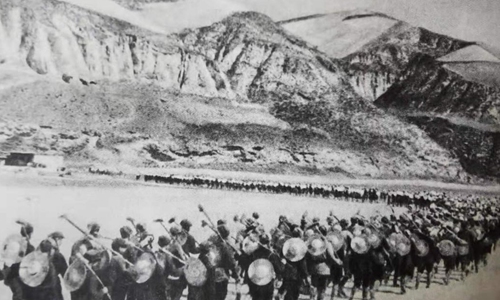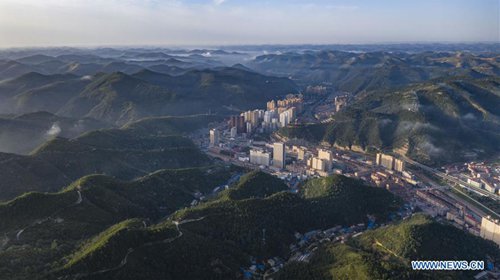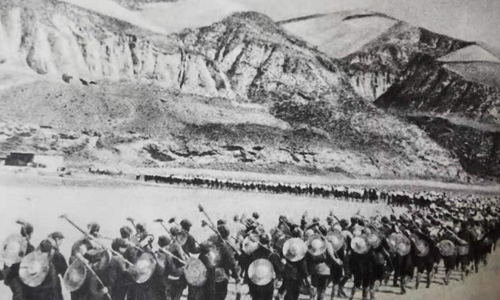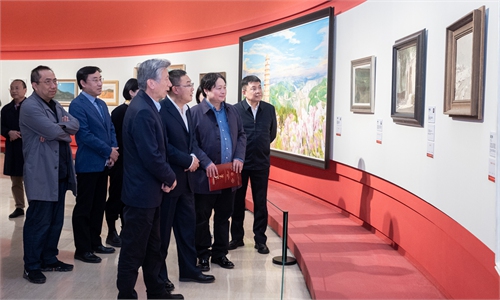Since the establishment of diplomatic ties between China and the Solomon Islands in September 2019, there has been continuous growth in mutual understanding between the people of both countries.
Dr Luke Mani, director of the Solomon Islands Foreign Policy Advisory Secretariat, had the opportunity to participate in a China International Press Communication Center Program hosted by the China Public Diplomacy Association from March 31 to June 29. During this program, he visited China and had the chance to witness various aspects of the country's rich culture and history. He shared his experiences and reflections on his journey through his column "Diary of my China Experience," which he publishes on Solomon Star and Facebook.
One of his memorable visits was to Yan'an, a sacred place for the Chinese revolution, where he encountered the profound historical significance of the region. Dr Mani expressed his emotions and profound thoughts about the visit, highlighting the lessons that can be learned from Yan'an's revolutionary history and its relevance not only to China but also to the world.
Dr Luke Mani Photo: Courtesy of Mani
After further tours of revolutionary sites across China, Mani delved into Yan'an's most well-known feature: its place in the revolutionary history of China.
Yan'an, located in Northwest China's Shaanxi Province, is a former revolutionary base of the Communist Party of China (CPC). It hosted the then headquarters of the CPC and was the center of the Communist revolution from 1935 to 1948. There, the CPC-led revolutionary cause made the transition from its low tide to high tide.
"Beyond the hardship, Yan'an impressed me most as being where the CPC symbolically became a legitimate party of the ordinary people of China. Unlike the more upscale revolutionary sites in urban Shanghai and Beijing that we also visited, Yan'an, particularly its crude cave-dwellings at Yangjialing, appears more relatable to the mostly agrarian and rural China of that era," Mani told the Global Times.
"Though initially borne out of necessity, these dwellings - no better than the cave-dwellings of ordinary Yan'an peasants - projected an image of simplicity that must have gone a long way toward endearing the Party to the rural people," he said.
He found that creativity and positivity also featured strongly in the Yan'an chapter. Barely surviving a civil war while facing Japanese aggression, literature and arts would seem to be the least likely preoccupation of the CPC. But under Chairman Mao Zedong's leadership, they actively recruited and nurtured some of China's finest talents in arts and literature and employed them at the war-front to boost morale. They also engaged with villages, towns and cities to forge connections with ordinary people.
At Yan'an, the Lu Xun Academy of Arts and Literature at the Qiaoergou Revolutionary site and the adjoining Yan'an Revolutionary Literature and Arts Museum collectively highlight these creative dimensions of the revolutionary CPC leadership.

Yan'an university students tilled land on top of mountains and planted crops of up to one thousand hectares
At Zaoyuan village there were signs of a confident and maturing CPC. Though the residences were still basic, they are masonry structures, not crude cave dwellings. A more expansive compound to host guests and forge communal bonding spoke of a more optimistic spirit, Mani recalled. A modest irrigation canal running through the village also underlines the simple but practical approaches that served the CPC so well in cultivating support among its rural hosts.
"Much of Yan'an's revolutionary history, I would argue, has relevance not just for China but also the world. Among the most important things are lessons on institutions, leadership legitimacy and the connectedness between the government and its subjects, the people," he noted.
Second was the principle of serving the people. "Service to the people," so profoundly demonstrated by these leaders is the motto and fundamental guiding principle of the CPC, Mani said. "In fact, the mobilization of talent from more affluent regions to lesser ones became an integral part of the CPC system, not just as part of a systematic leadership grooming process but also in its poverty alleviation and domestic economic development strategy."
Mani said the world can learn about the willingness to adapt and reform demonstrated at Yan'an.

Aerial photo taken on Aug. 10, 2019 shows a view of Ansai District of Yan'an, northwest China's Shaanxi Province. The city of Yan'an on the Loess Plateau, where 258 million tonnes of mud and sand were once washed into the Yellow River each year, has seen its landscape improve greatly. Since 1999, local government has returned 718,307 hectares of farmland to forests, increasing the local vegetation coverage rate from 46 percent in 2000 to over 80 percent at present. Data showed that the city reported fewer sand and dust days in recent years, and the annual amount of mud and sand washed into the Yellow River has been slashed by 88 percent to 31 million tonnes.(Photo: Xinhua)
"For the Solomon Islands in particular, we could look at ways to better forge connectedness between various institutions, starting from the villages right up to the central government. We could also look at ways to foster leaders' legitimacy beyond the ballot paper once every four years," he said.
"Most importantly, we should question the virtues of our adopted version of the Western liberal democratic system and perhaps figure out like the Chinese how to innovate our own unique system," he noted.
The shrine for China's revolution has continued to undergo tremendous changes in recent decades. In May 2019, Yan'an was officially taken off the list of impoverished areas, the Xinhua News Agency reported.
It is no longer a remote fortress with rampant hunger or barren land with poor harvests, but rather an up-and-coming city where passionate locals hold dreams of chasing prosperity.


